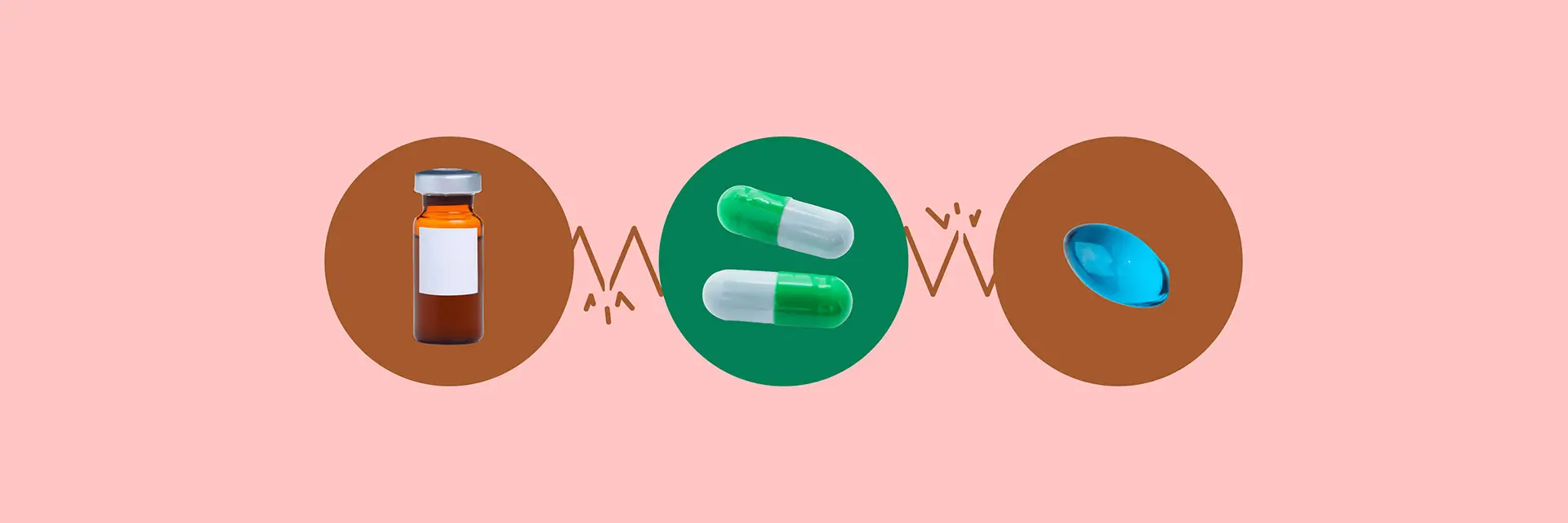Hydroxyzine, a prescription medication commonly used for allergies and anxiety, can be a valuable tool in managing various conditions. In the domain of pharmacology, understanding the potential interactions between medications and substances like alcohol is essential for maintaining health and safety. One such combination that demands attention is the pairing of hydroxyzine and alcohol. While both substances have their fair uses, their concurrent use can lead to significant risks and adverse effects.
This blog aims to delve into the properties of hydroxyzine, explore its interactions with alcohol, and shed light on the potential dangers associated with its simultaneous consumption, allowing you to make informed decisions about your health.
What is Hydroxyzine?
Hydroxyzine falls under the category of medications called antihistamines. It is generally used to treat allergic reactions, itching, anxiety, and tension. It belongs to a class of medications known as first-generation antihistamines, which are known for their sedative properties. These chemicals play a role in regulating sleep, mood, and allergic reactions. Hydroxyzine is generally available in tablet, capsule, and liquid forms. In addition to its antihistamine effects, hydroxyzine also has anti-anxiety and mild tranquilizing properties, making it useful in the management of different conditions. Its most common side effects include:
- Drowsiness
- Dry Mouth
- Headache
- Constipation
Understanding Alcohol’s Effects
Alcohol, conversely, is one of the most widely consumed psychoactive substances. While moderate alcohol consumption may have some health benefits, excessive drinking can lead to limitless adverse effects, including impaired judgment, motor coordination, and cognitive function. Moreover, alcohol is a central nervous system depressant, meaning it slows down brain activity and can generate feelings of relaxation and sedation.
The Dangers of Mixing Hydroxyzine and Alcohol
When hydroxyzine and alcohol are consumed together, their combined effects can intensify each other, leading to heightened sedation and central nervous system depression. Both substances act as central nervous system depressants, meaning they slow down the activity of the brain. When taken together, their effects can be additive, increasing the risk of adverse reactions such as:
1. Excessive Sedation:
The combination of these two substances can lead to excessive sedation, causing drowsiness, dizziness, and impairing cognitive function. This factor can elevate the risk of accidents, falls, and other injuries.
2. Respiratory Depression:
Central nervous system depressants like alcohol and hydroxyzine can subdue respiratory function. When taken together, they can further depress breathing, leading to shallow or slowed breathing and in severe cases, respiratory failure.
3. Increased Risk of Overdose:
Mixing such substances also increases the risk of overdose. Both can impair judgment and decision-making, leading individuals to consume higher doses than intended, which can result in overdose and even death.
4. Cardiovascular Effects:
Simultaneous use of these drugs can lead to changes in blood pressure and heart rate, increasing the risk of cardiovascular complications such as hypertension, arrhythmias, and even heart attack or stroke.
5. Impaired Motor Skills:
A combination of such substances can impair motor coordination and reaction time. Mixing them can worsen these effects, increasing the risk of accidents and falls.
6. Dehydration:
Both hydroxyzine and alcohol can contribute to dehydration, which can deepen other side effects and make you feel worse overall. Ensuring sufficient hydration is vital when using either substance to reduce these effects and promote overall well-being.
Additional Considerations
When hydroxyzine and alcohol are combined, they can significantly boost each other’s effects, leading to a variety of potential dangers. Some additional considerations encompass:
A. Individual Variations:
People metabolize medications and alcohol at different rates. Factors like age, weight, liver function, and overall health can influence how severely someone experiences the effects of mixing such substances.
B. Pre-existing Conditions:
Certain medical conditions, such as liver or kidney disease, can make individuals more susceptible to the negative interactions between hydroxyzine and alcohol.
C. Other Medications:
Combining hydroxyzine with other medications that have depressant effects, such as opioids or sleep aids, can further increase the risk of adverse reactions.
Substances to Avoid with Hydroxyzine
When taking hydroxyzine, there are several substances and activities you should avoid to ensure safety and minimize adverse effects. Here are some key considerations:
I. CNS Depressants:
Benzodiazepines, opioids, sedatives, and sleep aids can increase sedation and respiratory depression. Combining these substances can significantly impair cognitive and motor functions, heightening the danger of life-threatening respiratory issues.
II. Other Antihistamines:
Medications like diphenhydramine (Benadryl) can enhance sedative effects, leading to a greater likelihood of severe fatigue. This enhanced sedation can harm daily activities, making it dangerous to perform tasks requiring alertness.
III. Alcohol:
Amplifies sedation and increases the risk of severe drowsiness and respiratory issues, which can be life-threatening if not addressed promptly.
IV. Muscle Relaxants:
Drugs like cyclobenzaprine can further depress the central nervous system. Prompt medical attention is crucial to address any respiratory complications arising from the combination of hydroxyzine and alcohol.
V. Certain Antidepressants and Antipsychotics:
Tricyclic antidepressants and some antipsychotics increase sedation and heart rhythm risks. Hence, patients should be vigilant for symptoms of abnormal heartbeat.
VI. Heart Rhythm Medications:
Amiodarone and certain antibiotics can cause dangerous heart rhythm changes. Thus, it’s essential for individuals taking hydroxyzine to be cautious and inform their healthcare provider about any medications they are prescribed to minimize the potential for adverse effects on heart rhythm.
Precautions and Recommendations
Given the potential risks associated with mixing hydroxyzine and alcohol, it is essential to exercise caution and follow certain precautions:
● Consult Healthcare Provider:
Before consuming alcohol while taking hydroxyzine, it is crucial to consult a healthcare provider or pharmacist. They can provide personalized guidance according to each person’s health condition and prescribed medication routine.
● Limit Alcohol Consumption:
If hydroxyzine is prescribed, it is advisable to limit alcohol consumption or abstain from drinking altogether. Even moderate alcohol consumption can potentiate the effects of hydroxyzine, increasing the risk of adverse reactions.
● Avoid Dangerous Activities:
Individuals taking hydroxyzine should avoid engaging in activities that require alertness and coordination, such as driving or operating heavy machinery, especially when consuming alcohol.
● Monitor for Adverse Effects:
Be watchful for signs of excessive sedation, respiratory depression, or other adverse effects when combining hydroxyzine and alcohol. It is advisable to consult a healthcare professional if any concerning symptoms appear.
Conclusion
In summary, the combination of hydroxyzine and alcohol presents significant risks that should not be overlooked. While hydroxyzine serves as a valuable medication for various conditions such as anxiety and allergic reactions, its interaction with alcohol can lead to heightened sedation, respiratory depression, and increased risk of overdose. Understanding these risks is necessary to ensure the safety and well-being of individuals who may be prescribed hydroxyzine or consume alcohol. It is essential for healthcare providers to educate their patients about the potential dangers of mixing these substances and to encourage open communication about medication use and alcohol consumption. Eventually, prioritizing caution and informed decision-making can help prevent adverse outcomes and promote healthier habits.
If you or someone you know is prescribed hydroxyzine or consumes alcohol regularly, don’t hesitate to reach out to our healthcare professionals at BHouses. Remember, when it comes to hydroxyzine and alcohol, awareness is key to staying safe. Take the first step towards safer and healthier habits by seeking guidance from our professionals, who can provide personalized care suited to your needs.
FAQ
1. What cannot be mixed with hydroxyzine?
Mixing opioid pain medications and other antihistamines like Benadryl with hydroxyzine can make you very sleepy and increase the risk of accidents. Hydroxyzine can also interact with drugs like amiodarone, some antibiotics, and medications for mental health, which you should be aware of.
2. Why is hydroxyzine a high-risk medication?
These medicines carry a slight risk of changing how the heart’s electrical system works, potentially resulting in irregular heartbeats or, in severe cases, cardiac arrest. It’s important to be aware of these potential complications and seek medical attention if any concerning symptoms arise.
3. Does hydroxyzine calm panic attacks?
Multiple healthcare professionals suggest hydroxyzine to manage anxiety or acute panic-related conditions. Although various medications can treat panic attacks, hydroxyzine might alleviate anxiety-driven panic attacks within just 15 to 30 minutes.
4. Can you sleep off hydroxyzine?
Hydroxyzine is sometimes prescribed to improve sleep quality. It can reduce the time it takes to fall asleep and extend overall sleep duration, although higher doses may lead to residual effects known as “hangover.” Potential side effects include dry mouth, headaches, and, in some cases, hallucinations.










